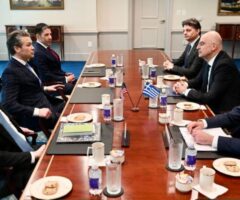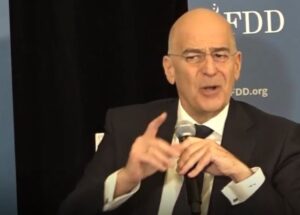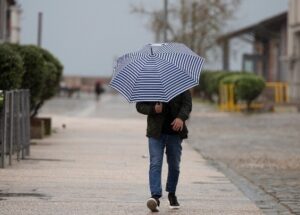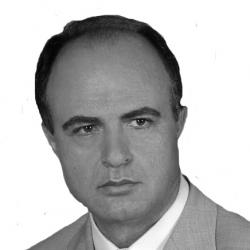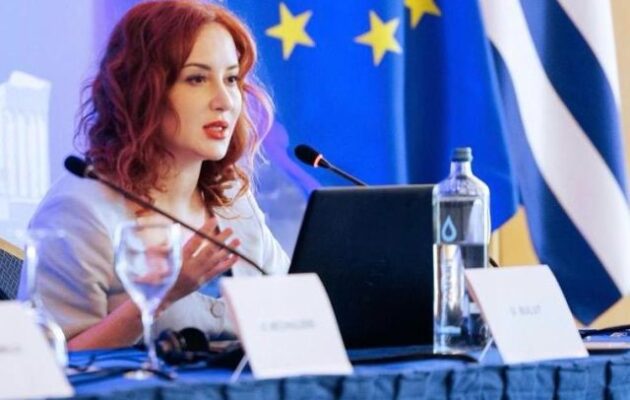
 ΔΕΙΤΕ ΠΡΩΤΟΙ ΟΛΑ ΤΑ ΝΕΑ ΤΟΥ TRIBUNE ΣΤΟ GOOGLE NEWS
ΔΕΙΤΕ ΠΡΩΤΟΙ ΟΛΑ ΤΑ ΝΕΑ ΤΟΥ TRIBUNE ΣΤΟ GOOGLE NEWS 
Patriots for Europe’s Conference in Athens Sheds Light on Pontic Greek Genocide
Patriots for Europe (PfE, also known as the Patriots), is the third-largest group in the European Parliament and they organized an event called “Study Days in Athens” from May 22 to May 24.
Various topics were discussed by Members of European Parliament (MEP), scholars and other experts as part of the conference.
These topics included a May 24 panel regarding Turkey’s 1914-23 Pontic Greek Genocide. Among the speakers were Dr. Nikos Michailidis, a sociocultural anthropologist (PhD, Princeton University), and Uzay Bulut, a Turkey-born journalist who regularly covers Greek-related issues and Christian persecution in Turkey and the wider region.
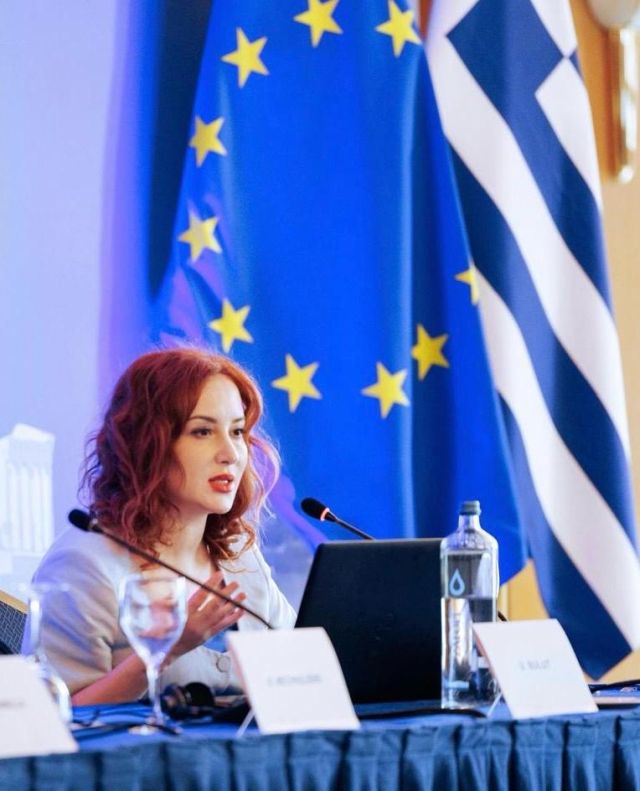
Bulut started her speech as follows:
“As you can tell from the way my name sounds, I have a Turkish name. But I recently learnt that my grandmother on my father’s side knew Greek, prayed in Greek and was obviously crypto Christian. My grandmother – a beautiful Greek woman – was obviously too scared to talk about her Greek identity and Christian faith. This speaks volumes about how intolerant Turkish society is in general. I learnt about my grandmother’s Greek prayers only about two months ago, so today I dedicate my presentation to her.”
Below, you can read Bulut’s speech entitled “Pontic Greek Genocide 1914-1923 and Ongoing Christian Persecution in Turkey”.
The name of Pontians (or Pontic people) derives from the Greek word “Pontus,” meaning “the sea.” It refers to the Greek population who lived for three millennia in the Black Sea coastal cities, which are now located in northern Turkey. The first Greek settlements appeared in the region as early as 800 BC, and many renowned Greek philosophers (such as Diogenes and Strabo) were born there.
Pontus also holds significant Biblical importance. Pontus is mentioned several times in the New Testament, highlighting its role in the early Christian church.
The Greek presence in Asia Minor dates back to the 11th century B.C.
In the 8th and 9th centuries BC, Greeks built many cities and towns such as Miletus, Ephesus, and Smyrna on the western coast of Asia Minor and Sinope, Amisos, as well as Trapezus (Trabzon) on the Black Sea (Pontos or Pontus) coast.
In 667 BC, Greeks from the city of Megara (near Athens) founded the city of Byzantium.
In 330 CE, Constantinople was founded on the site of Byzantium as “the new Rome.“
For more than a millennium, Constantinople was the capital of the Eastern Roman Empire, better known as the Byzantine Empire.
The Hagia Sophia in Constantinople was the world’s greatest church until the Ottoman Turks invaded the city in the 15th century and turned this magnificent edifice into a mosque.
If it were located in a country that respects history, religious freedom and cultural heritage, then the Hagia Sophia would still be recognized and respected as the church that it was built to be.
The Turkish government, however, turned it into a museum in 1934, then back into a mosque in 2020.
Christianity has a long history in Asia Minor and was once the region’s majority religion. During much of the first century, Asia Minor was the home of the early church.
When the population consisted mostly of Greeks, Asia Minor was home to the seven churches of the Book of Revelation and seven ecumenical councils.
Much of the New Testament was written either to, or from, the churches in Asia Minor.
Many saints were born there and the three major apostles—St. Peter, St. Paul, and St. John—either ministered or lived in Asia Minor.
With its military and diplomatic strength, the Byzantine Empire defended Western Europe from repeated Persian, Arab, and Turkish invasions.
However, Anatolian Christianity began to decline in the eleventh century. In 1071, Turkic tribes from Central Asia invaded the Armenian highland, which was then part of the Byzantine Empire.
After the Ottoman Turks established a state in Asia Minor in 1299, they escalated their attacks on surrounding regions.
The Byzantine Empire ended when Ottomans invaded and captured Constantinople in 1453. A few short years later in 1461, the Ottomans invaded and captured the Greek Empire of Trebizond in Pontus.
Under the new Ottoman Muslim rulers, Christians and Jews became “dhimmis,” second-class citizens forced to pay a high tax in exchange for “protection.”
The most destructive blow to Greek and other Anatolian Christians was the 10-year genocide that took place before, during, and after the World War I. Around three million Christians (Armenians, Assyrians, and Greeks) in Asia Minor were massacred.
The International Association of Genocide Scholars (IAGS) has recognized this Ottoman campaign against Christian minorities period as genocide.
The Greek Genocide refers to the systematic extermination of the native Greek subjects of the Ottoman Empire before, during, and after World War I (1914-1923).
It was instigated by two successive governments of the Ottoman Empire: the Committee of Union and Progress, also known as the Young Turks, and the Turkish nationalist movement, which would later establish the Turkish Republic.
These forces massacred or deported Greeks across Asia Minor, Pontos and Eastern Thrace.
A good resource regarding the history of the Greek genocide is “the Greek Genocide Resource Center”.
The Pontian Greek genocide was part of the broader Christian genocide in Ottoman Turkey. About 353,000 Pontic Greeks were murdered.
This genocidal campaign aimed at creating a Turkish Muslim national state – “Turkey for the Turks”.
Turkey then exiled those who survived through a population exchange between Greece and Turkey in 1923. Pontian Greeks now reside in Greece, the United States, Russia, Germany, Australia, and Canada, among other countries.
The whole world should officially recognize the Pontian Greek Genocide. European nations in particular have a moral duty to recognize this genocide.
Throughout the centuries and during the genocide, many Greeks converted to Islam in order to continue living in their ancestral homeland. Many continued to speak Greek and practice Greek customs, despite having to leave Christianity. Some, just like my grandmother, became crypto-Christians for fear of their lives.
Today, millions of Turkish citizens in Pontus and other parts of Asia Minor thus have Greek ancestry.
Over a hundred years have passed since the Pontian Greek Genocide, but the Turkish government continues to aggressively deny the genocide. It also continues to erase the few remaining Christian religious and cultural artifacts in the region.
Trabzon’s historic Hagia Sophia, the third and youngest of Turkey’s Hagia Sophias, is now a mosque.
The Ottomans first converted it into a mosque, and in 1964 Turkey turned the building into a museum. Since 2013, however, it has been a mosque again. Christian symbols in the church have been damaged or destroyed, and curtains create a separate section for women inside.
According to the official website of the EU: “Turkey is a key strategic partner of the EU on issues such as climate, migration, security, counter-terrorism and the economy.”
“In 1987, Turkey applied to join what was then the European Economic Community, and in 1999 it was declared eligible to join the EU.”
Turkey officially became a member of NATO in 1952.
What does Christian persecution look like in Turkey? According to Open Doors, an international human rights organization that monitors Christian persecution, Christians in Turkey suffer from Islamic oppression, religious nationalism, dictatorial paranoia, and ethno-religious hostility. (The data below is from Open Doors’ reports.)
“In Turkey, nationalism and Islam are intrinsically linked and anyone who is not a Muslim, particularly a convert or someone who openly lives out their different faith, is not seen to be a loyal Turk.
“Society’s very strong religious Turkish nationalism places much pressure on Christians, leaving almost no space for Christians to make an alternative message heard.
“Similarly, Turkish secularism is also strongly nationalistic, with Christianity being viewed by both Muslims and secularists as a negative Western influence.
“Converts to Christianity from a Muslim background bear the brunt of rights violations. They are considered traitors to Turkish identity.
“Fanatical Turkish nationalism affects all ethnic and religious minorities in Turkey. The general opinion is that a true Turk is a Muslim. Conversion is also seen as “insulting Turkishness”. Converts may even face threats of violence from Turkish nationalist and Islamist groups.
“Greeks, Armenians and Assyrians/Syriacs continue to face societal pressure and violence, as well as legal challenges and economic exclusion.”
Despite being a central place in the foundation of Christianity, today only 0.1% of Turkey’s population is Christian—mainly Greek, Armenian, or Assyrian Christian.
The collapse of Turkey’s Christian communities is a result of centuries-long persecution which includes genocides, expulsions, pogroms, forced conversions to Islam, official and civil discrimination, and other human rights abuses.
There is, however, a growing Christian demographic through Turkish converts to Christianity, many of whom convert to a Protestant church.
For years, the Protestant community in Turkey has struggled with many problems, including a lack of official recognition by the Turkish government. (The data below is from Open Doors’ reports.)
“It is impossible to register as a new religious community in Turkey. Although there is an option for churches to register as an “association”, this is also a difficult process, and some applications are denied.
“Obtaining permits for building, repairing or renovating church buildings is a long and difficult process, made more so by anti-Christian sentiments within the bureaucracy.
“Legally training Christian leaders is impossible. The seminaries of the historical Christian communities (Greeks and Armenians) were shuttered in the 1970s and have remained closed ever since. Therefore, only unofficial training can occur.
“In recent years the government started to target and ban foreign (mostly Western) Christians from the country, including Christians with Turkish spouses and children. This policy continued in 2024, with several foreign Christians receiving an immigration restriction code and being refused entry to the country. These actions were all based on false or vague charges, such as ‘being a threat to national security’.
“Those Protestant Christians who have been targeted have no criminal record and had lived in Turkey without any previous problems, demonstrating a respect for law and order.
“These bans seem to be a deliberate attempt to isolate the Turkish Protestant church.”
More Examples of Discrimination and Persecution against Christians in Turkey:
“Public expressions of non-Muslim faiths can result in harassment. Displaying Christian symbols can provoke hostility and physical violence.
“Traditional Christians (Greeks, Armenians and Assyrians) are socially and economically excluded from the wider Turkish society. They have limited access to state employment, and experience discrimination in private employment, especially where employers have ties to the government.
“Converts from Islam to Christianity can lose their jobs, face harassment from family and friends, or receive threats after their new faith has come to be known.
“Children of Christian converts are often harassed and bullied because their family is perceived as having betrayed both the Islamic faith and the nation.
“Children whose parents are either expatriates or who belong to one of the historical Christian communities are also seen as ‘enemies of Turkey’ because they are viewed as being part of the ‘Christian West.
“The Turkish educational curriculum is heavily influenced by Turkish nationalism and portrays Christianity as foreign and hostile to Turkish society.
“For Christians in Turkey, access to public sector employment and other social and economic opportunities is highly restricted.
“Article 301 of the Turkish Penal Code states that: ‘A person who publicly denigrates the Turkish Nation, the Republic or the Parliament of Turkey, shall be punishable by imprisonment,’ meaning that Christians must exercise extreme caution when publicly expressing themselves.
“Islamic education is compulsory. While non-Muslim children can opt out, they are likely to face ostracization and discrimination from teachers and classmates.
“The media is heavily influenced by Turkish nationalist pressure from the state and regularly attacks non-Muslim minorities.
“Christians are consistently scapegoated and discriminated against by newspapers and television as a way of both suppressing Christian voices and intimidating more tolerant Turks into silence.”
The right to return and revert to Christianity
So what should be done? Here are my recommendations. For Turkey to be a true democracy, Turkey should officially recognize the Christian Genocide of 1914-23, give up its Islamic aggression and expansionism, allow for the return of millions of Greeks to their ancestral homelands in Turkey, and repudiate Islam’s death penalty for apostasy so that millions of Turkish citizens of Greek and Armenian descent whose ancestors were forcibly converted to Islam can safely return to Christianity.
Thank you for listening.



















































